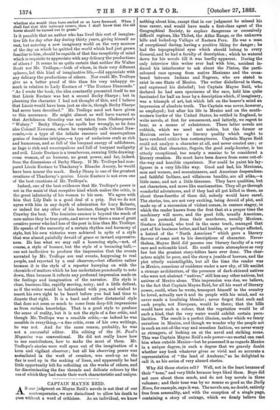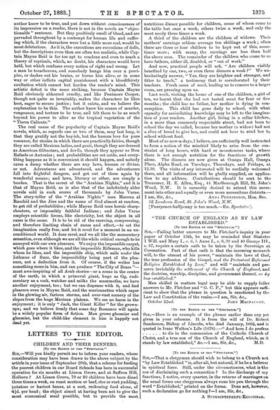CAPTAIN MAYNE REID.
AS our judgment on Mayne Reid's novels is not that of our contemporaries, we are disinclined to allow his death to pass without a word of criticism. As an individual, we know nothing about him, except that in our judgment he missed his true career, and would have made a first-class agent of the Geographical Society, to explore dangerous or excessively difficult regions, like Thibet, the Atlas Range, or the unknown hills and locked-up Valleys of Eastern Peru. He was a man of exceptional daring, having a positive liking for danger ; he had the topographical eyes which should belong to every General, and he had a faculty of description ; which he watered down for his novels till it was hardly apparent. Daring the only interview this writer ever bad with him, accident in- duced his interlocutor to ask about the Pintos, the parti- coloured race sprung from native Mexicans and the cross- breed between Indians and Negroes, who are stated to exist in one State of Mexico. The writer disbelieved in them, and expressed his disbelief; but Captain Mayne Reid, who declared he had seen specimens of the race, held him quite fascinated for half an hour by a description which, if imaginary, was a triumph of art, but which left on the hearer's mind an impression of absolute truth. The Captain was never, however, so employed ; but after his life in Mexico and on the south- western border of the United States, he settled in England, to write novels, at first for amusement, and latterly, we regret to hear, as a means of subsistence. These latter novels are rubbish, which we need not notice, but the former or Mexican series have a literary quality which ought to have rendered critics less contemptuous. Captain Mayne Reid could not analyse a character at all, and never created one ; or if he did, that character, Seguin, the good scalp-hunter, is too utterly exceptional, too nearly a maniac to be considered a literary creation. He must have been drawn from some out-of- the-way and horrible experience. Nor could he paint his lay- figures in a very life-like way. Good and bad, his Mexicans, men and women, and mountaineers, and American desperadoes, and faithful Indians, and villainous bandits, are all alike,—a little same, and not a little tiresome. They have qualities, but not characters, and move like marionnettes. They all go through wonderful adventures, and if they had all got killed in them, as about three-fourths of them did, nobody would have cared. The stories, too, are not very exciting, being devoid of plot, and made up of a succession of violent scenes, in essence stagey, in which the reader knows from the first that at a proper time the machinery will move, and the good folk, usually American, will be protected from their murderers, usually Mexican. Gustave Aimard, who trod in the same track, managed that part of his business better, and had besides, or perhaps affected, a hatred of the "North American" which gave a literary flavour of some sort to his descriptions of character. Never- theless, Mayne Reid did possess one literary faculty of a very rare and noticeable kind. He could create atmosphere as very few but the greatest story-tellers have ever done. The char- acters might be poor, and the story a jumble of horrors, and the plot utterly unintelligible, but all the time the reader was in Mexico, conscious of residence under a new sky, of life amidst a strange architecture, of the presence of dark-skinned natives who were not abstract "natives," still less any other natives, but natives of Mexico alone. This impression was due, we believe, to the fact that Captain Mayne Reid, for all his want of literary power, could, when he wrote, transport himself to the country he loved, actually saw it and its people with his mind, and so never made a localising blunder; never forgot that such and such people, not European, would be there; that the hills would have such a colour, that the vegetation would be of such a kind, that the very water would exhibit certain pecu- liarities. The result is a perfect illusion, under which we fancy ourselves in Mexico, and though we wonder why the people act in such an out-of-the-way and senseless fashion, we never weary as strangers, of looking on at the novel and striking scene. This was Captain Mayne Reid's sole power—no mortal can read him when outside Mexico—but he possessed it as regards Mexico in a unique degree, in such a degree that we gravely doubt whether any book whatever gives so vivid and so accurate a representation of "the land of Anahuac," as he delighted to call it, as his series of very absurd stories.
Why did those stories sell? Well, not in the least because of their "tone," and very little because boys liked them. Boys did not care about them much, and do not buy novels in three volumes ; and their tone was by no means so good as the Daily News, for example, says it was. The novels are, no doubt, entirely free from sensuality, and with the exception of a single page, containing a story of outrage, which we firmly believe the
author knew to be true, and put down without consciousness of its impression on a reader, there is not in the novels an " objec- tionable " sentence. But they positively smell of blood, and are pervaded throughout by a contempt for human life and suffer- ing which, if the characters were but a little more real, would be most deleterious. As it la, the executions are executions of dolls, but the descriptions even then are often too realistic, while Cap- tain Mayne Reid is far too apt to condone and even to teach a theory of reprisals, which, no doubt, his characters would have held, but which confuses every notion of right and wrong. Let a man be treacherous, and somebody hangs him over a preci- pice, or dashes out his brains, or burns him alive, or in some way or other inflicts capital punishment with a bloodthirsty exultation which cannot but harden the reader's mind. This artistic defect is the more striking, because Captain Mayne Reid obviously abhorred cruelty, and like Fenimore Cooper, though not quite so invariably, makes the characters he likes best, eager to secure justice; but it exists, and we believe the explanation to be this. The author knew his scenes of murder, vengeance, and torture to be true, aria felt them to be as much beyond his power to alter as the tropical vegetation of the "Tierra Caliente."
The real cause of the popularity of Captain Mayne Reid's novels, which, as regards one or two of them, may last long, is that they gratify not the boyish, but the human love for pure romance, for stories in which there are practically fairies, though they are called Mexican ladies, and genii, though they are dressed as American filibusters, and devils, though they appear as Don Rafaels or Antonios ; and probabilities are set aside, and every- thing happens as it is convenient it should happen, and nobody cares a dump whether there are any laws, human or divine, or not. Adventures are adventured, and the adventurers fall into frightful dangers, and get out of them again by wonderful means; and laws, literary or other, are simply a burden. That is the secret of the "Arabian Nights," and it is that of Mayne Reid, as is also that of the indefinitely abler novels sold in such scores of thousands by Jules Verne. The story-teller of the "Arabian Nights" uses Haroun al Raschid and the Jius and the name of God almost at random, to get rid of probabilities ; while Mayne Reid uses heroic sharp- shooters, or impossibly faithful Indians ; and Jules Verne employs scientific forces, like electricity, but the object in all cases is the same. It is to be rid of the coercing, compressing, and therefore limiting chain of cause and effect,—to set the imagination really free, and let it revel for a moment in an un- conditioned world. It does revel, and we all like the momentary sensation, even although we are all the while critical enough to be annoyed with our own pleasure. We enjoy the impossible carpet, which goes where it likes, and the impossible Rifleman, who kills whom he likes, and the impossible ship, which sails under the Isthmus of Suez, the impossibility being part of the plea- sure, not a deduction from it. Of course, if the writer has something more in him, and can produce "The City of Brass "- most awe-inspiring of all Arab stories—or a scene in the centre of the earth, in which a primeval giant, huge as Og, rudi- mentary as a rock, watches and milks the mammoths, we have another enjoyment, too ; but we can dispense with it, and find pleasure even in Mayne Reid, and the marionnettes which caper in the glowing air, furious storms, and over-vast scenery of the slopes from the huge Mexican plateau. We see no harm in the enjoyment; it is only "Jack, the Giant Killer" for the grown- ups; and we believe firmly that some day Romance will again be a widely popular form of fiction. Man grows gloomier and gloomier, but the child-like element in him is happily not dead yet.



































 Previous page
Previous page